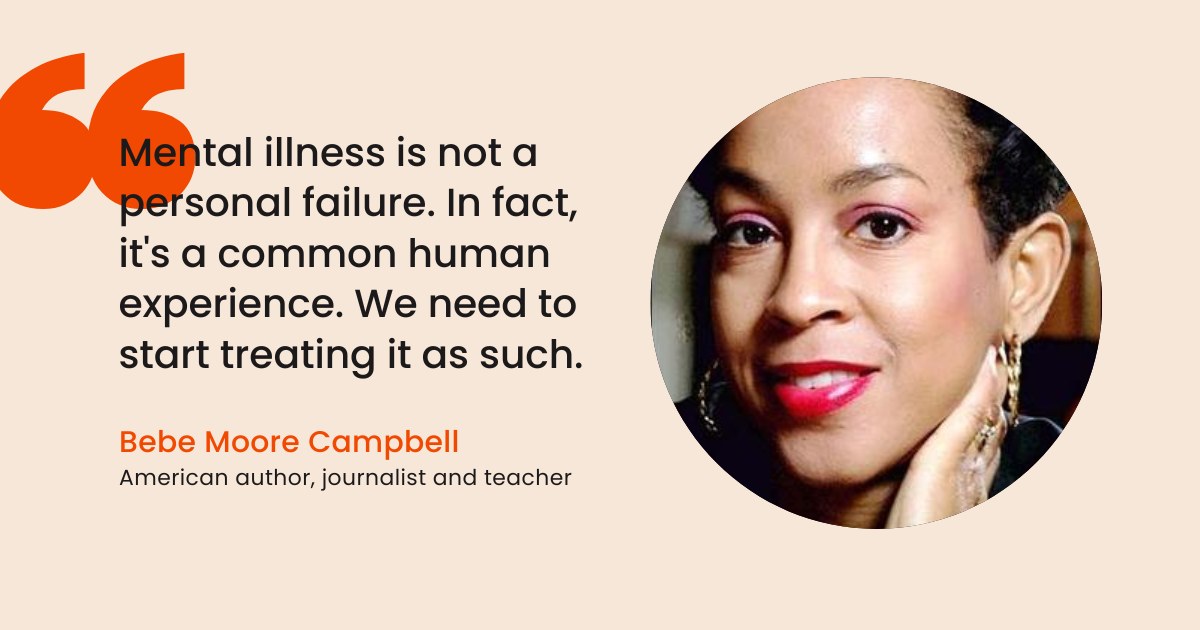This morning, while sifting through my emails, I came across one from To Write Love on Her Arms , one of my favorite nonprofit organizations. The subject line informed me that July is BIPOC Mental Health Month. The bold, beautiful colors caught my eye, and when I read the message shared below, I knew I had to learn more.
For those unfamiliar with BIPOC, it stands for Black, Indigenous, People of Color. Originally called National Minority Mental Health Awareness Month. In 2008, the first National Minority Mental Health Awareness Month was recognized in memory of Bebe Moore Campbell.

Bebe Moore Campbell was an American author, journalist, teacher, and mental health advocate who worked tirelessly to shed light on the mental health needs of underrepresented groups. In 2005, inspired by Campbell’s charge to end stigma and provide mental health information, her longtime friend, Linda Wharton-Boyd, suggested dedicating a month to the effort. The duo got to work, outlining the concept of National Minority Mental Health Awareness Month and what it would entail. Sadly, in November 2006, Campbell lost her battle with cancer.
The purpose of this month is to highlight the unique mental health challenges and needs of historically disenfranchised or oppressed racial and ethnic groups in the United States. The Mental Health America’s 2023 BIPOC Mental Health campaign theme is Culture, Community, & Connection. The campaign aims to highlight how culture, community, and connection can support and uplift BIPOC individuals in the face of oppression and systemic racism.
Message from To Write Love on Her Arms
The message in the email said:
“If you’ve ever felt that your mere existence is wrong, that your culture should be watered down in order to be accepted, and that the hate you experience is somehow your fault, it is only valid to feel that your struggles don’t matter. To the young Black woman speaking up in a conference room of white co-workers, to the child of first-generation immigrants, to the Asian-American mother keeping her family’s culture alive, to the Brown boys growing up with fear, and to every Indigenous community still asking to be heard: You are living proof of generational hope and resilience, of strength and community carried through the years. This world can be heavy, and your safety, joy, and hope are sacred. Your work to break the cycle of generational trauma is not a burden to those around you. Communal healing is a journey we go on together and this dedication to moving forward honors those who came before you. You are living proof of their stories still going. Of their legacies continued. Let the roots that ground you be the foundation that allows you to grow. Let your love of where you come from light the path to where you’re going. You deserve to do more than just survive.” – TWLOHA
Ways to support BIPOC mental health
- Push for accessibility in traditional healthcare and mental health services.
- Hold organizations and institutions accountable for addressing mental health disparities and promoting equity.
- Post support for the cause on social media and encourage others to repost and share your message.
- Learn more about the unique mental health challenges faced by BIPOC communities and how to be an ally.
- Attend events, workshops, and webinars hosted by mental health professionals and organizations to learn more about BIPOC mental health and how to support it,



